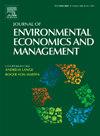Agreeing on public goods or bads
IF 5.9
3区 经济学
Q1 BUSINESS
Journal of Environmental Economics and Management
Pub Date : 2025-01-18
DOI:10.1016/j.jeem.2025.103123
引用次数: 0
Abstract
Without regulation or agreement, public goods are underprovided and public bads are overprovided. Both problems are usually seen as flip sides of the same coin. In this paper we examine a situation where a public good is good for some agents but bad for others, depending on the provisioning level of the good. We allow agents to form a coalition to coordinate this provision. Our results show that, compared to games with only goods (or only bads), larger coalitions form in equilibrium. For a game specification with quadratic benefit- and cost functions, we find the grand coalition to be stable except when agents have identical or almost identical characteristics. The primary driver of coalition stability is the avoidance of a wasteful contest between agents pulling the provision level in opposing directions. In equilibrium, such wasteful contests are confined to a narrow range within the parameter space. This result connects the literatures on public goods and contests.
对公共利益或公共利益达成一致
没有监管或协议,公共产品供应不足,公共产品供应过剩。这两个问题通常被视为同一枚硬币的两面。在本文中,我们研究了一种情况,即公共产品对某些代理人有利,但对另一些代理人不利,这取决于该产品的供应水平。我们允许代理人组成一个联盟来协调这项规定。我们的研究结果表明,与只有好处(或坏处)的游戏相比,更大的联盟在均衡状态下形成。对于具有二次收益和成本函数的博弈规范,我们发现除非代理具有相同或几乎相同的特征,否则大联盟是稳定的。联盟稳定的主要驱动因素是避免代理之间无谓的竞争,这些代理将供应水平拉向相反的方向。在均衡状态下,这种浪费的竞争被限制在参数空间的一个狭窄范围内。这一结果将有关公共物品和竞赛的文献联系起来。
本文章由计算机程序翻译,如有差异,请以英文原文为准。
求助全文
约1分钟内获得全文
求助全文
来源期刊
CiteScore
8.00
自引率
4.30%
发文量
91
期刊介绍:
The Journal of Environmental Economics and Management publishes theoretical and empirical papers devoted to specific natural resources and environmental issues. For consideration, papers should (1) contain a substantial element embodying the linkage between economic systems and environmental and natural resources systems or (2) be of substantial importance in understanding the management and/or social control of the economy in its relations with the natural environment. Although the general orientation of the journal is toward economics, interdisciplinary papers by researchers in other fields of interest to resource and environmental economists will be welcomed.

 求助内容:
求助内容: 应助结果提醒方式:
应助结果提醒方式:


